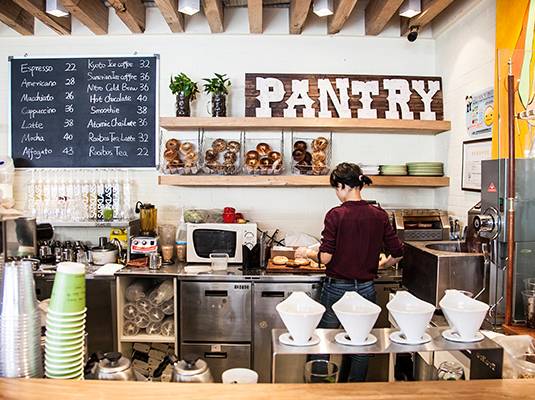Is it wise for coffee shops to gather in shopping malls?
Coffee has risen from a cup of drink to a cultural symbol. Under the infiltration of coffee culture, coffee brands speed up horse racing enclosure this year. The latest statistics from the Beijing Business Research Institute show that China's coffee market is entering an unprecedented period of rapid development, including Starbucks, Kashijia, Coffee and other brands will open more than 1000 new coffee stores in the Chinese market. According to a survey by a reporter from the Beijing Business Daily, it has become the norm to have 4-5 coffee shops in regional shopping centers, and three coffee brands will appear in community shopping centers. Is it really wise for coffee brands to huddle into shopping malls?

Coffee shop hand-to-hand combat
The opening speed of coffee chain brands in China has reached a new high. Starbucks and coffee accompany you are typical representatives. Starbucks, an American coffee chain that has been in the Chinese market for 16 years, threw out its latest "five-year plan" at the end of last year and proposed to have 3400 stores in China in 2019. Starbucks official told Beijing Business Daily that Starbucks currently has 1600 stores in China and will open about 400 stores a year in the future. There are also Korean brand coffee to accompany you. Since entering China in 2012, the number of coffee stores with you has exceeded 600, and 400 new stores are planned to be opened in 2015.
Coffee shops have become standard in shopping malls, but with the increase in the number of new stores, the accumulation of coffee chain brands is becoming more and more serious. Take Beijing SKP as an example, coffee brands have a "stacked" layout. A reporter from the Beijing Business Daily visited and found that there are at least four coffee brands in Beijing SKP, of which the central area of the first floor is a fully open The caf é, Kashijia is located at the bottom merchant with floor-to-ceiling windows on the east side of the 1st floor, and three Coffee shops are located in the central area of the 2nd, 4th and 5th floors respectively. From the decoration of the enclosure, the first floor of the underground food area will also usher in Starbucks.
Different from the vertical overlap of shopping malls in the fourth Ring Road, in the regular business circle outside the Fifth Ring Road, coffee chain brands launch a horizontal hand-to-hand fight. Longhu long couplet Street Shopping Center and Hualian BHG Shopping Center, which live separately on the north and south sides of Changying subway station, have introduced two coffee brands respectively. Longhu long couplet Street Shopping Center chooses Zoo Coffee and Starbucks, while Hualian BHG Shopping Mall introduces coffee to accompany you and Ka Shijia. From the perspective of brand collocation, the two shopping malls also chose the brand combination of "European and American + Korean".
A loose policy on rent
It is not without reason that coffee shops are clustered in shopping malls. Judging from the current market situation, domestic coffee consumers have obvious population characteristics, and there is still a gap in per capita consumption between China and foreign countries. Pang Enshuai, a consultant at Beijing Dizhicheng Enterprise Management Consulting Co., Ltd., said that the contemporary coffee culture created by Starbucks, Kashijia and other European and American coffee brands is mainly aimed at office workers and company white-collar workers. Korean coffee brands mainly attract young and fashionable consumers by creating a leisure and entertainment consumption environment. In addition, there are more consumers who have not been discovered. Some data show that at present, the per capita annual coffee consumption in China is 5 cups, which is far lower than the annual per capita level of about 300 cups in Japan and South Korea.
From the perspective of coffee chain brand management, even if the coffee shop is clustered seriously in the shopping center, there is not too much business pressure. The manager of a shopping center in Haidian District told the Beijing Business Daily that most of the shopping malls do not charge fixed rent for coffee chain brands, but take the way of running water upside down to earn the harvest, with a percentage of about 8%, 12%, and the operating costs of the coffee shop mainly come from the staff. The official said that the shopping mall in the choice of coffee chain brands, mainly considering the image of the mall itself and the wishes of coffee chain brands, in addition to no other stringent conditions.
Drive brand upgrading
In the face of increasingly fierce market competition, coffee chain brands are also looking for a new way out. In terms of operation and location, the cross-border management model of Pacific Coffee appears to be quite innovative. A reporter from the Beijing Business Daily learned that Pacific Coffee has successively carried out cross-industry operations such as "coffee bank", "hospital" and "coffee shop", and has found a good breakthrough in the location of new stores.
With the continuous improvement of domestic consumers' cognitive ability of coffee, the requirements of coffee shops are no longer limited to the quality of coffee, but also need high-awareness coffee brands, comfortable store environment and good service ability. Ka Shijia said that Kashijia always adheres to category innovation and attracts consumers through new categories of food. Zoo coffee officials said that while zoo coffee is selling coffee, it is also selling places, atmosphere, style and lifestyle. Pang Enshuai, a consultant at Beijing Dizhicheng Enterprise Management Consulting Co., Ltd., believes that chain coffee brands should strengthen the training of talents when accelerating store expansion to ensure standardized services in stores.
Beijing Business Daily reporter Li duo Chen Keyuan / Wen Dai Xiaojie / watchmaking
Source: Beijing Business Daily (Beijing)
Important Notice :
前街咖啡 FrontStreet Coffee has moved to new addredd:
FrontStreet Coffee Address: 315,Donghua East Road,GuangZhou
Tel:020 38364473
- Prev

All orders that are not for the purpose of drinking coffee are hooliganism, a blood and tear control from the barista.
All orders that are not for the purpose of drinking coffee are hooligans! If you are a barista, congratulations, in addition to being able to watch love for free, all kinds of weird customers will also be your type. Don't cry, as long as the love for coffee still exists, I believe the barista will always have a spring day! Baristas refer to professional coffee-making service personnel who are familiar with coffee culture, production methods and skills.
- Next

Five latest design products in the coffee industry, thinking is greatly inspired
-1-Wall-mounted coffee machine there are many kinds of coffee machines on the market, among which the ES3 Espresso coffee maker brought by STRIETMAN recently is very interesting. It is small and exquisite, and for wall-mounted design, you only need to pour in water and coffee powder in order, wait for the built-in heater to heat, press the handle, and a cup of Espresso can be enjoyed. -2.-caffeine spray
Related
- What brand of black coffee is the most authentic and delicious? what are the characteristics of the flavor of the authentic Rose Summer Black Coffee?
- Introduction to the principle and characteristics of the correct use of mocha pot A detailed course of mocha pot brewing coffee is described in five steps.
- Which is better, decaf or regular coffee? how is decaf made?
- How much is a bag of four cat coffee?
- How about four Cat Coffee or Nestle Coffee? why is it a cheap scam?
- Which is better, Yunnan four Cats Coffee or Nestle Coffee? How about cat coffee? is it a fake scam? why is it so cheap?
- How about Cat Coffee? what grade is a hoax? which instant coffee tastes better, four Cat Coffee, Nestle Coffee or G7 coffee?
- Process flow chart of coffee making-Starbucks coffee making process what coffee tastes good at Starbucks
- The top ten best coffee beans in the world Rose summer coffee or Tanzanian coffee tastes good
- Yunnan four cat coffee is good to drink?_four cat coffee is a big brand? four cat blue mountain coffee is fake?

